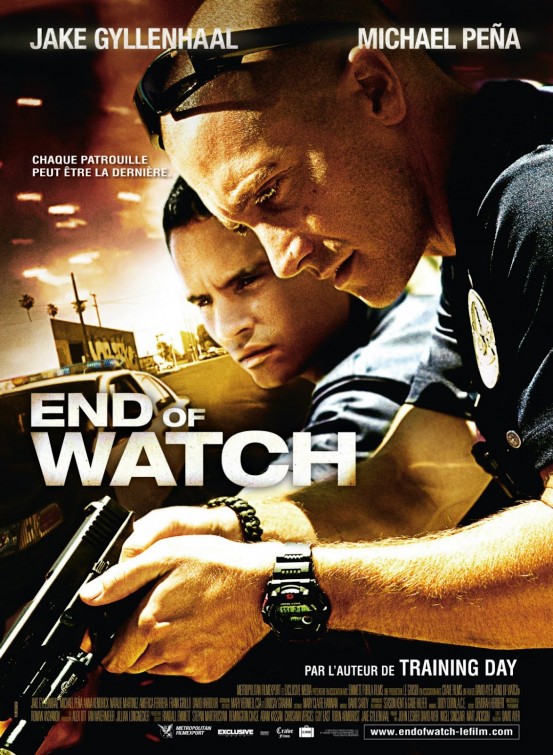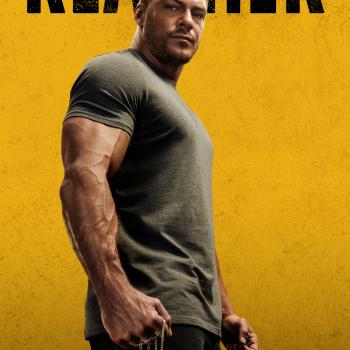Review of End of Watch, Directed by David Ayer
The first thing I heard about End of Watch was its realistic and moving portrayal of male friendship. I watched the film with that expectation and it did not disappoint. End of Watch follows the patrols of Brian Taylor (Jake Gyllenhaal) and Mike Zavala (Michael Peña), two policemen in South Central Los Angeles. We watch them drive the streets, engage in shootouts, encounter violence against a female policewoman, catch drug smugglers, discover a torture house, and stumble on a human trafficking hideout. But these are all supporting elements to the relationship between Taylor and Zavala.
Conversations during the late night patrol shift, figuring out who to marry, sharing memories–these are the building blocks of the film. There is no single “bad guy” who they’re trying to take down. While there is a group of criminals that come to the fore and end up being given a directive to neutralize Taylor and Zavala, the focus remains on the friendship.
That’s the highlight of End of Watch. It’s worth watching just for the relationship between these two characters. They are partners facing a city rife with Hispanic-Black ethnic tensions, drugs, guns, and trafficking. There is definitely some social commentary when it comes to ethnic divisions in urban environments and the disturbing persistence of crime in American cities. End of Watch also pays tribute to the great service policemen provide to society, despite the cynical attitude we’ve grown accustomed to when it comes to law enforcement, and the sacrifices their families and loved ones must make. 
I immediately compared End of Watch to Stand Up Guys (2012), which I reviewed in January. End of Watch exemplifies what “stand up” guys should be. There’s crude joking and inappropriate humor in both films, but End of Watch has the gravitas that should anchor any true friendship. In some ways, the rough edges help keep the film realistic. This is how people really live their lives. While Stand Up Guys contributed a comic (dare I say shallow?) depiction of male friendship, End of Watch gets to its quintessence. Of course, Stand Up Guys was billed as a comedy, so it can’t be judged too harshly for not accomplishing what it didn’t set out to achieve, but such portrayals of male friendship still reflect the popular consciousness of a generation.
Taylor and Zavala actually tell each other at various times that they love one another. As is common in our historical context, such words are said often in a joking manner in order to get the idea across while guarding from accusation of homosexual overtones. And that’s what we see in End of Watch, though there is a moment or two of seriousness expressing their love. Is it ideal that our culture doesn’t allow the use of love language in a platonic sense between two men? No. But at least End of Watch doesn’t stop there since we actually see that love played out in the way they risk their lives for each other and face life’s challenges side-by-side.
The starkest example of this cultural bias is how later critics treat the love between David and Jonathan, which some have naturally posited as evidence of homosexual love in the Old Testament. David sang of Jonathan, “Your love for me was wonderful, more wonderful than that of women” (2 Samuel 1:26b). Or we’ve all heard historical speculation of Abraham Lincoln’s sexual orientation since he used to share a bed with a co-worker when he traveled around in his younger years; or the suspicions about Alexander Hamilton due to his overly affectionate letters to male friends. The list can go on. Our culture apparently cannot believe that two men can love each other in a non-sexual way.
With this cultural milieu in mind, End of Watch should be celebrated not only for bringing male friendship to the screen in a realistic, nitty-gritty way, but it also acts as an attractive model. All that I’ve written above can be infinitely qualified—as all generalizations about nebulous notions of “cultural tendencies” should be—but I think it’s a real social issue that needs to be addressed. End of Watch sparks this conversation and I commend it to our readers.
(End of Watch is rated R for violence and language)












